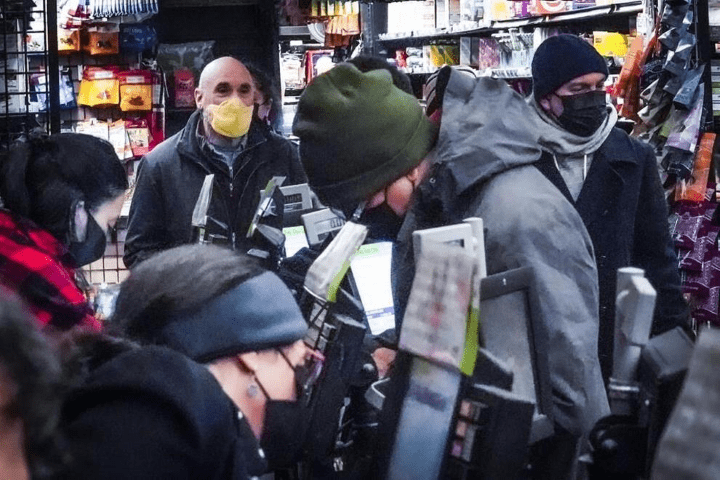
Joe Holtz, second from left top, co-founder and general manager at Brooklyn's Park Slope Co-Op grocery store, walks the store's isles where a policy requires shoppers to mask up Wednesdays and Thursdays, Thursday, Dec. 7, 2023, in New York. (AP Photo/Bebeto Matthews)
In the hustle and bustle of the holiday season, scenes of crowded shopping centers, warehouse stores, and busy transportation hubs abound. Yet, amid this familiar frenzy, a conspicuous absence lingers – the scarcity of face masks. While the occasional mask-wearer can be spotted, the ubiquitous face coverings that defined the early days of the COVID-19 pandemic's first winter holidays are notably missing.
As the curtain descends on 2023, with promises of festive gatherings and inadvertent shared air exchanges, mask-wearing appears to be more the exception than the rule across the nation, even as the prolonged impact of COVID endures. Widespread mask mandates, once a divisive topic that stirred contention and scorn, now seem like relics of the past, akin to the Ghost of Christmas Past, offering a fleeting glimpse into a bygone era.
In the current landscape, mask-wearing has metamorphosed into a commonplace occurrence in America. In a country where pre-pandemic references to masks typically invoked thoughts of Halloween or costume parties, this practice has become a lingering, albeit not universal, norm. Brooke Tully, a strategist specializing in behavior change, notes the unique nature of mask-wearing in the U.S., emphasizing its emergence as a novel behavior and norm in the wake of COVID.
The current state of mask-wearing is best described as situational. Instances such as the University of Pittsburgh Medical Center's decision to reinstate a mask mandate due to a rise in respiratory viruses illustrate the context-dependent nature of this practice. Individuals like Sally Kiser from North Carolina, who manages a home health care agency, carry a mask but use it selectively, adapting to the evolving paradigm of the world they inhabit.
Reflecting on the not-so-distant past, the surge in demand for masks during the peak of COVID-19 fears led to the introduction of terms like "N95" and discussions about mask mandates. However, as mandates receded, so did the demand for masks, with organizations like Project N95 halting sales due to waning interest. Anne Miller, the executive director of Project N95, expresses surprise at the divergence from her expectation of widespread and enduring mask usage.
Markus Kemmelmeier, a sociology professor at the University of Nevada, Reno, offers insights into the dynamics of social norms, citing historical examples like the resistance to seatbelt laws. He emphasizes the nuanced nature of practices becoming ingrained in society, shaped by cultural divisions and political orientations.
In Brooklyn's Park Slope Co-op, a unique approach to mask requirements has emerged. Members instituted mask-required days to protect the immunocompromised, showcasing a thoughtful consideration of vulnerable populations. This nuanced approach reflects the evolving attitudes toward mask usage, acknowledging that responses differ based on context and circumstance.
Amid this evolving landscape, individuals like Aron Halberstam, 77, navigate a middle ground, choosing to wear masks on designated days without resistance. Kemmelmeier notes a cultural shift where people, for various reasons, continue to wear masks in specific settings without government mandates. Whether in crowded stores or during travel, masks persist as a choice made for personal reasons, adapting to evolving needs, such as addressing poor air quality during wildfires.
In conclusion, the once contentious debate over masks has evolved into a nuanced and situational practice in the United States. The cultural shift is evident as mask-wearing, though not universal, continues to find its place in daily life, responding to varied needs and circumstances.















